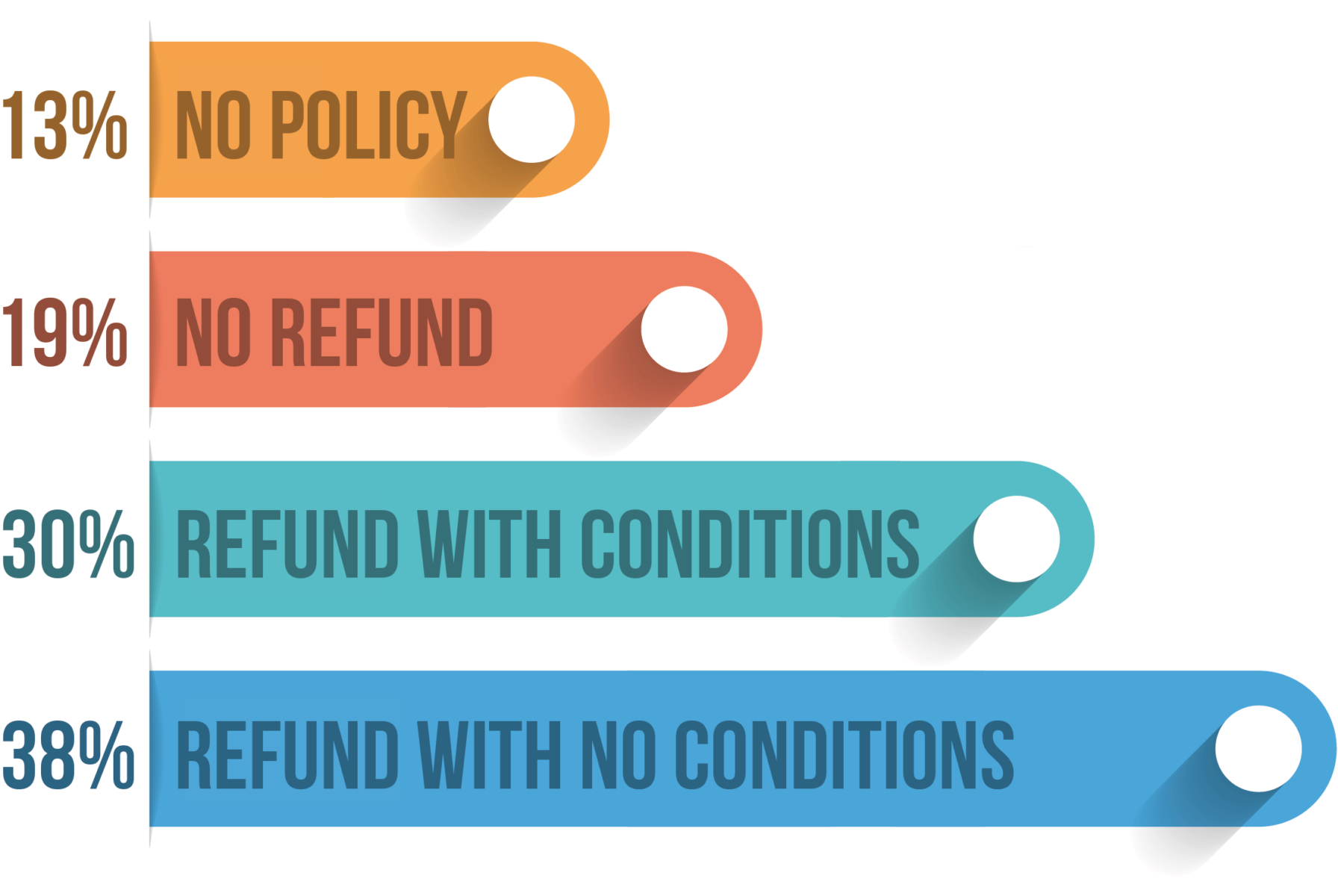I started writing this post because I’ve been thinking a lot about what kind of refund policy to have for my own products. Logically, I’ve always felt that offering a refund makes sound business sense but I can’t help the nagging feeling that refunds on digital products are just an invitation for people to steal your work.
Initially I thought I would just write up some thoughts on the subject and maybe include some best practice examples of refund policies. In fact, I ended up contacting nearly 100 theme and plugin shops and as I found out more about how other people approached the subject, I started to change my mind about my own approach.
So, if you’d like to find out more about refund policies and refund rates, read on.
What kind of refund policy do theme and plugin shops offer?
Out of the 94 premium WordPress theme and plugin providers that I surveyed, I found the following:

We can see that over two thirds of stores offer refunds to their customers.
Types of refund policies
I broke down the different approaches into four categories:
- No policy
- No refunds under any circumstance
- Refunds but conditions apply
- Unconditional refunds
It’s also worth pointing out that a substantial number of theme shops that I surveyed sold their themes exclusively via Theme Forest, which has its own refund policy and which I didn’t consider for this article.
No policy
There were 10 sites that didn’t have any reference to a refund policy anywhere.
Michael Hebenstreit, from MH Themes, describes the rationale for not having a policy like this:
Michael Hebenstreit, MH Themes

This is an interesting idea: by not having a refund policy, you deter the type of customer who is likely to make potential refund requests, thereby keeping your refund rate low. In order to achieve this, you need to put the work in to ensure that you present everything the customer could want to know up front.
No refunds under any circumstance
I found 14 sites that had a definitive policy ruling out refunds under any circumstance.
This was the only category where I didn’t receive a response from a theme shop. Maybe it was coincidence, but no shop owner seemed to want to defend a policy that didn’t permit refunds.
Typically, clauses ruling out any refunds are brief and most refer to the impossibility of returning digital goods. One or two explicitly refer to the risk of being defrauded.
Refunds but conditions apply
There were 23 sites that had an explicit policy that allowed for refunds under certain circumstances. These circumstances varied, though generally there was a requirement to attempt to first resolve any issues via support.
This type of refund policy was always hidden away on a T&C page and not that easily discoverable by a customer.
Bhanu Ahluwhalia, from My Theme Shop, explains that they changed their policy in 2014 from no refunds to allowing refunds under certain conditions. He puts it like this:
Bhanu Ahluwhalia, My Theme Shop

Unconditional refunds
I found 29 sites that had a “no questions asked” refund policy. Almost always, this policy is advertised on the site’s homepage or on product or pricing pages.
Frequently, the policy is framed as a Money Back Guarantee and features a badge or commitment statement from the company, like the example from Proteus Themes below. This very much forms part of the company’s marketing. An unconditional refund policy is there to create trust.

Scott Rollo from the Theme Foundry describes their process when a customer requests a refund:
Scott Rollo, The Theme Foundry

Justin Tadlock from Theme Hybrid:
Justin Tadlock, Theme Hybrid

Theme Forest
There were 18 sites that sold their themes exclusively through Theme Forest.
As an absolute giant in the world of WordPress themes, you’d expect Theme Forest to have an extensive refund policy… And they do. (Hint: it’s not that easy to get a refund.)
Ben Ritner from Kadence Themes describes it from the point of view of a customer:
Ben Ritner, Kadence Themes

Mike Stott from Epic Plugins also raised the Envato issue.
Mike Stott, Epic Plugins

What are the benefits of having a refund policy?
While not everyone is convinced of the value of a refund policy, there are some consistent benefits listed by those that do:
- Increase sales
Rich Tabor from ThemeBeans puts it succintly:
Rich Tabor, ThemeBeans

Shri from SKT Themes changed their refund policy:
Shri, SKT Themes

- Customer peace of mind
Katie Keith from Barn2 Media describes how customer peace of mind contributes to sales:
Katie Keith, Barn2 Media

Scott Rollo also refers to peace of mind.
Scott Rollo, The Theme Foundry

- Trust
Leland Fiegel from Themetry:
Leland Fiegel, Themetry

- Repeat business
Rich Tabor, ThemeBeans

- Prevent negative reviews
Ben Ritner, Kadence Themes

What are the legal requirements?
I am most definitely not a lawyer. If you’re concerned about legal requirements in this area then you should consult with an expert.
Interestingly, however, I noticed a couple of theme shops referring to an EU directive in their T&Cs indicating that consumers have no legal right to apply for refunds for digital products: https://europa.eu/youreurope/citizens/consumers/shopping/guarantees-returns/index_en.htm.
I think the point here is that you can put your foot down and refuse to issue a refund if you want. You just have to consider whether this is the best approach from a customer service point of view.
What are the risks associated with refund policies?
Probably the biggest fear around refund policies is the notion that unscrupulous customers will buy your theme or plugin, request a refund, then continue using the product.
However, in all the responses I had, I don’t think anyone actually flagged fake claims as an issue. Ben Sibley from Complete Themes describes how he changed policy:
Ben Sibley, Compete Themes

As we saw from Ben Ritner’s quote above, if a customer finds it difficult to get a refund from you, they’re going to remember it. And they’re unlikely to come back to buy anything in the future. And of course, they’re going to tell others about their experience.
Ben Ritner, Kadence Themes

You can mitigate against fake claims, however, by ensuring that your products are continually updated with new features and bug fixes. Any users who are trying to scam the system by continuing with your product will not have access to updates or support and will quickly find that their version of your product is out of date.
What are the typical refund rates?
Refund rates are not just a reflection of your refund policy. The complexity, maturity and quality of your product also clearly play a part.
Understandably, not everyone was willing to share their refund rates. However, I did receive figures from 16 shops and we can see that people are typically operating at a refund rate of 1% or under.
I broke the figures down according to the type of refund policy:
| Less than 1% | 1% | 2% to 9% | |
|---|---|---|---|
| No refunds | 1 | ||
| No policy | 1 | ||
| With conditions | 2 | 4 | 1 |
| No conditions | 3 | 4 |
Bear in mind that there wasn’t a consistent reporting method here – some shops were able to give quite a precise figure, others less so.
I’m not sure that the data set is large enough to draw too many deeply meaningful conclusions. However, from the table we can see that refund rates are higher for shops that have refund policies. It sounds obvious but certainly bears out Michael Hebenstreit’s comments above.
We don’t know from these figures what effect refund policies have on sales. Many of the respondents to my survey clearly believe that the benefits of a refund policy outweigh the costs of making refunds.
What would be really interesting here is if providers were to run some A/B tests… I don’t know if anyone has ever done this?
[Update, 3 February 2018: WP Geo Directory published an article on their website just after I published this article. They actually discuss how they transitioned from a no-refunds policy, through to a policy with conditions, and ended with a money back guarantee policy. It’s the nearest to an A/B test I’ve seen.]
How long should you allow for a refund claim?
While doing the research, I was surprised to find a couple of providers offering 60 day money back guarantees.
I think this partly depends on the complexity of your product. Delicious Brains, for example, offer 60 days. The potential downside to this is that people who only want your product short term can use it then get a refund.
Steven Gliebe from Church Themes is a proponent of a longer refund period (Steven also wrote this article in 2014 about refunds):
Steven Gliebe, Church Themes

Ben Sibley, Compete Themes

How to reduce refund requests
Even if you offer refunds, you want to avoid them as much as possible. There are some steps you can take:
- Make sure your documentation and support are solid
- Test your product thoroughly
Michael Hebenstreit, MH Themes
- Consider live chat
Shri, SKT Themes

- Freemium model
Elliot Condon from Advanced Custom Fields describes how their freemium model is behind an extremely low refund rate:
Elliot Condon, ACF

Refund best practices
If you do get a refund request, I believe there are a few steps to take to ensure the best possible experience for your customer.
- Offer to help or fix any issues first. Obviously this is helpful to the customer, but it’s also helpful to you as it gives you an insight into your products from customer point of view
- Find out why the customer is asking for a refund. Depending on your policy, the reason for the request might not affect whether a refund is due – but it’s useful for you to know why the customer changed their mind.
Ben Gillbanks from Pro Theme Design describes their process:
Ben Gillbanks, Pro Theme Design

- If you’re going to do it, do it quick. Don’t let customers hang around on tenterhooks, wondering when they’ll see their money again
- Customer satisfaction is crucial to the success of any business. That applies even when the customer has decided they don’t want to be a customer any longer. Leave them feeling that they’ve been well-treated by you – they might come back later or tell others about their good experience.
Elliot Condon, ACF

Should you have a refund policy?
Yes, says Rich Tabor:
Rich Tabor, ThemeBeans

No, says Michael Hebenstreit:
Michael Hebenstreit, MH Themes

What did I learn?
- In my opinion, with a refund policy, it’s probably better to go to one of the extremes – either don’t have a policy at all, or make your MBG central to the buying experience
- Personally, I’m no longer worried that a refund policy is an open-door invitation to people to steal my products. As a direct result of researching this article, I’ve changed the policy on this site to allow unconditional refunds and I’ve highlighted this on every page
- And of course, I’ve learned how incredibly open people are in the WordPress community. I’d like to thank everyone who took the time to contribute to this article.
Excellent survey and interview of major WordPress business owners. We also offer refund over a 14 days period but only if our plugin do not work as describe and we are unable to make it work for the buyer.
There are situations where the buyers are adamant they want a refund without allowing us to help. We sometimes just refund them for peace of mind sake.
Coincidentally we wrote about refunds today too. We simply explained why, based on our experience, the unconditional refunds policy is by far the best .
Hi Paolo – that’s a great article and I’ve updated this article to refer to your experiences.
During these 5 years that my shop has been open, I think I had about 5 malicious refund requests, in which the person continued using the themes.
In the majority of these cases the fraudster was a developer-level buyer doing contract work for customers. So they would buy the theme, get the files, refund the purchase, use the theme files to build a custom website for an end customer and then charge at least ten times more than the initial purchase.
What can you do, right? 🙂
Yes, that’s pretty crappy.